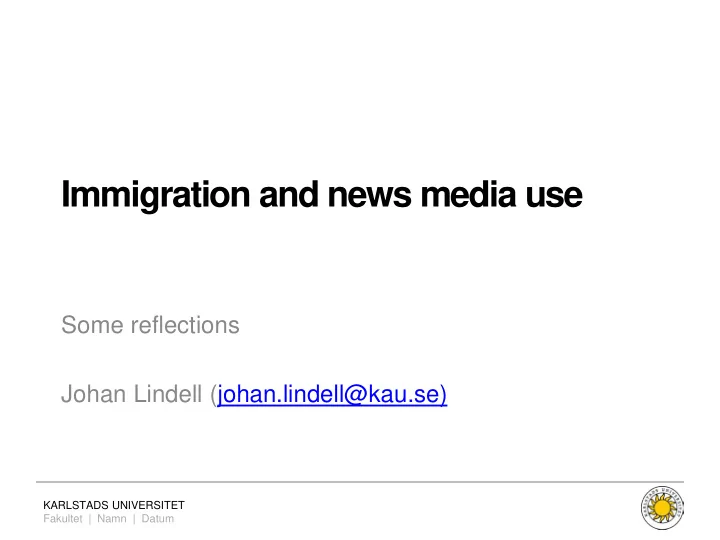

Immigration and news media use Some reflections Johan Lindell (johan.lindell@kau.se) KARLSTADS UNIVERSITET Fakultet | Namn | Datum
Four reflections • Dr. Freddi’s report has made me reflect on the following: 1. What should be expected of journalism in a globalized world? 2. Does the use of data from online platforms imply the end of conventional social scientific methods? 3. The elite status of DN.se. 4. What about information from other news outlets? What about incidental exposure to news? KARLSTADS UNIVERSITET Fakultet | Namn | Datum
1.) What role should journalism play in a globalized world? • Journalism for a world in which “violation of laws in one part of the world is felt everywhere” (Kant in Nussbaum, 1997: 1) • Normative debates in media and communication studies ”Global journalism” (Berglez, 2008) ”Global media ethis” (Ward, 2005; 2010) Journalism for a cosmopolitan civil society (Beck, 2006; Robertson, 2010) KARLSTADS UNIVERSITET Fakultet | Namn | Datum
• Study suggests that journalists find it hard to work ”globally” (even though they would want to) (Lindell & Karlsson, 2016). • …and Dr. Freddi’s study shows that audiences display a ”compassion fatigue” (Moeller, 1999) in not engaging with news about immigration. • Double challenge. • What hopes are there for a global journalism and cosmopolitan civil society respectively? Do we want a global journalism and if so, how can it be promoted? KARLSTADS UNIVERSITET Fakultet | Namn | Datum
2.) The advent of ”found data” • ”The immensely inflated news audience”: self-reported news use vs. actual news use (Prior, 2009). • Self-reported newspaper reading is correlated with positive attitudes to immigration (Lindell, 2014; 2015). • Social sciences have relied on ”made data” (interviews, surveys, experiments). • Dr. Freddi’s study brilliantly uses ”found data” (Bruhn Jensen, 2010) to go beyond bias of self-reports. • Clicks, ”likes”, ”retweets”, comments, cookies etc are crystallized human actions , ready to be used…but by whom and for what purpose? • What happens to the relevancy of the social sciences when some of the best data is privately owned and difficult to access? The process and the cooperation with DN? KARLSTADS UNIVERSITET Fakultet | Namn | Datum
3.) The Swedish class structure and the location of DN.se in that map • Exploring the Swedish class structure via Bourdieu (1984). • Mapping the distribution of economic and cultural capital in the Swedish population and studying consumption of news in that map (Lindell, in-press). • Where in the Swedish class structure is the consumption of DN.se most common? KARLSTADS UNIVERSITET Fakultet | Namn | Datum
Sailing Visits opera often DN.se daily Golf Jazz, classical music DN.se 3-6/week Hunting DN.se seldom Dislike golf/hunting/sailing Motorsports, ”dansband” DN.se never Dislike jazz Simplified modell from Lindell (in-press) KARLSTADS UNIVERSITET Fakultet | Namn | Datum
DN.se readers are more educated and have higher salaries than the average Swede….is the DN.se readership really representative of the Swedish population, as you claim? What would happen to your results if you studied non-elite media? Maybe DN.se is not the place to learn about immigration? Practical possibilities to access the click data from other news providers? KARLSTADS UNIVERSITET Fakultet | Namn | Datum
4.) Digital news users and their ”news repertoires” • ”[Media] audiences are inherently cross-media” (Schröder, 2011). • Can other sources in peoples’ news repertoires inform about immigration? News on social media? • What about incidental exposure to news? For example radio- and TV news that do not presuppose a ”click”? KARLSTADS UNIVERSITET Fakultet | Namn | Datum
Thank you for listening! KARLSTADS UNIVERSITET Fakultet | Namn | Datum
References Beck, U (2006) Cosmopolitan Vision . Cambridge: Polity. Berglez, P (2008) What is Global Journalism? Journalism Studies 9 (6): 845–858. Bourdieu, P (1984) Distinction: A Social Critique of the Judgment of Taste . New York, London: Routledge. Bruhn Jensen, K (2010) New media, old methods – Internet methodologies and the online/offline divide. In Burnett, R. Consalvo, C. & Ess, C (Eds.), The Handbook of Internet Studies (pp. 43-58). Wiley Blackwell. Lindell, J (2014) Cosmopolitanism in a Mediatized World: The Social Stratification of Global Orientations . PhD Diss. Karlstad: Karlstad University Studies. Lindell, J (2015) Mediapolis, where art thou? Mediated cosmopolitanism in three media systems between 2002 and 2010. International Communication Gazette 77(2): 189-207. Lindell, J (In-press) Distinction recapped: Digital news repertoires in the class structure. New Media & Society. Lindell, J & Karlsson, M (2016) Cosmopolitan journalists? Global journalism in the work and visions of journalists. Journalism Studies 17(7): 860-870. Moeller, S (1999) Compassion Fatigue: How the Media Sell Disease, Famine, War and Death . London: Routledge. Nussbaum, M.C (1997) Kant and Stoic Cosmopolitanism. Journal of Political Philosophy 5(1): 1-25. Blackwell. Prior, M (2009) The immensely inflated news audience: Assessing bias in self-reported news exposure. The Public Opinion Quarterly 73(1): 130-143. Robertson, A (2010) Mediated Cosmopolitanism: The World of Television News . Cambridge: Polity. Schröder K.C (2011) Audiences are inherently cross-media: Audience studies and the cross-media challenge. Communication Management Quarterly 18(6): 5–27. Ward, S (2005) The Philosophical Foundations for Global Journalism Ethics. Journal of Mass Media Ethics: Exploring Questions of Media Morality 20 (1): 3–21. Ward, S (2010) Global Journalism Ethics . Montreal & Kingston, London, Ithaca: McGill-Queen’s University Press. KARLSTADS UNIVERSITET Fakultet | Namn | Datum
Recommend
More recommend